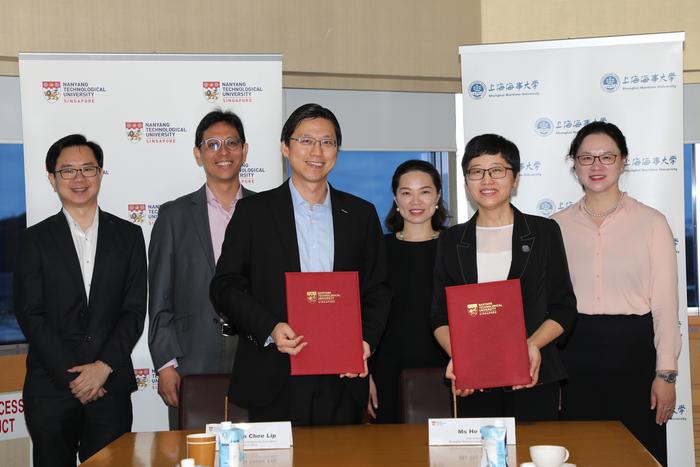Nanyang Technological University, Singapore (NTU Singapore) and Shanghai Maritime University (SMU) have established new partnerships aimed at enhancing the learning experience for maritime students in both universities.

Credit: NTU Singapore
Nanyang Technological University, Singapore (NTU Singapore) and Shanghai Maritime University (SMU) have established new partnerships aimed at enhancing the learning experience for maritime students in both universities.
Two new five-year collaborations will allow SMU students to study full-time at NTU Singapore’s School of Civil and Environmental Engineering (CEE) in the final year of their four-year undergraduate degree programme.
The students also have the option to enrol in selected one-year full-time Master of Sciences postgraduate degree programmes at NTU, subject to the usual admission requirements.
Students from both NTU and SMU will also benefit from cross-country exchange, under an agreement which allows up to 24 students from each side to participate in an immersion programme each academic year.
The partnerships were inked at NTU on Thursday, by NTU Associate Provost (Undergraduate Education) Professor Gan Chee Lip and SMU Vice Chair of Shanghai Maritime University Council Ms He Li.
The signing ceremony was witnessed by CEE Associate Chair (Academic) Associate Professor Yang En-Hua, CEE Associate Chair (Students) Dr Teo Chee Chong, SMU Deputy Director of the President’s Office Ms Chen Jiaer, and SMU Deputy Director of the International Office & Deputy Dean of the International Education College Ms Wang Yingming.
NTU Associate Provost (Undergraduate Education) Professor Gan Chee Lip, said: “The latest partnerships between NTU Singapore and Shanghai Maritime University are a testament to the growing relationship that NTU has in China, which has strengthened in recent years. As a leading university based in a global maritime hub, NTU will leverage its strong interdisciplinary approaches in pedagogy and research to support better learning for the next generation of global maritime leaders. We are confident that the partnership will result in the imparting of valuable industry-relevant skills that will benefit students from both countries and contribute to the growth of the maritime industry. NTU students, in particular, will now have more opportunities to experience maritime education in one of the busiest shipping ports in the world, on top of existing collaborations with other countries.”
SMU Vice Chair (University Council) Ms He Li said: “The collaboration indicates the expanding and strengthening linkage between SMU and institutions in Singapore, reflecting a shared commitment to fostering educational excellence and cross-cultural communication. We believe this will build a bridge of solid connectivity and a platform for continuous improvement for the students from both universities. As we work together, exerting the strengths in the maritime field of SMU and integrating innovative teaching methods, we look forward to contributing to the growth of marine education and the pool of advanced shipping talent worldwide.”
Supporting maritime talent and development
Singapore and Shanghai are home to some of the busiest ports in the world. As trends such as digitalisation and environmental sustainability have gained traction in recent years, new opportunities in areas such as maritime cyber security and alternative fuel operations have emerged.
Maritime & Port Authority of Singapore Chief Executive Mr Teo Eng Dih, said, “The new partnerships between the Singapore Nanyang Technological University and Shanghai Maritime University affirm the commitment to deepen the sharing and exchange of talent and knowledge pool of maritime students between both countries. As the champion agency driving the growth of Maritime Singapore, the Maritime and Port Authority of Singapore has always been supportive of talent and professional development, including areas of digitalisation and decarbonisation that will transform the maritime industry.”
SMU students completing their final year at NTU are required to complete 36 Academic Units worth of coursework, including an option of a final year project.
Over 30 courses are offered, such as Shipping Economics, Shipping Management and Maritime Technology, to prepare students for professional careers in the maritime sector.
***END***



